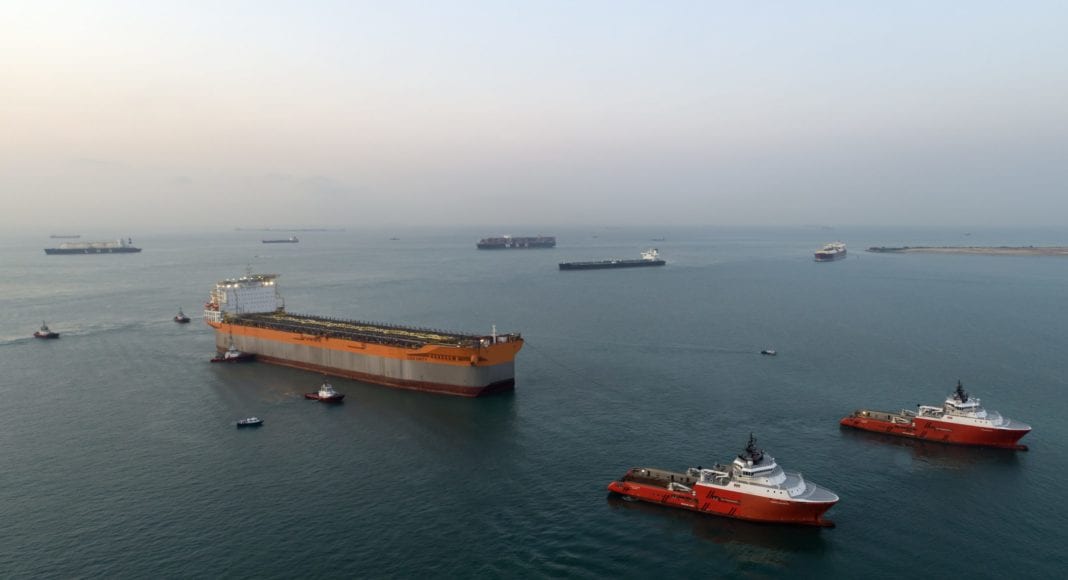Norway-based Rystad Energy said in a new report it expects offshore investments to rebound from 2021 with 40% of spending linked to construction of new floating facilities.
According to the Rystad Energy analysis, budgets will be cost-wary, and among Asian rivals, Chinese yards are better-placed to attract them.
“Asia is the undisputed market leader for construction and conversion of FPSO vessels, with leading fabrication yards for hull construction mainly located in China, Singapore, South Korea and Japan,” Rystad Energy said. “Low unit prices, resulting from cheaper labor and material prices, combined with large capacity, have helped these yards attract customers for offshore fabrication from all around the world.”
US oil major ExxonMobil is projected to expend around US$50 billion in project sanctioning over the next 10 years for its offshore development activities in Guyana that will see several Floating Production Storage and Offloading units being delivered by the end of the decade.
“We believe that ExxonMobil and its partners could commit at least one new FPSO unit each year for the next ten years to Guyana. So, we also estimate that more than 1.2 million barrels a day of production could be sanctioned by 2025,” Schreiner Parker, Rystad Energy’s Vice President for Latin America and the Caribbean, told OilNOW in July.
The research and business intelligence company said it has compared hull construction costs for a newly built FPSO at the China, Singapore, South Korea and Japan yards and found that, despite scoring low on productivity, Chinese yards are the most competitive with 30% lower prices than their Japanese rivals. Building a hull in a Chinese yard costs on average $94 per cubic meter. South Korea follows with $111, Singapore with $128 and Japan with $135 per cubic meter.
“Even if Chinese productivity is the least competitive, low wages compensate for the productivity deficit, allowing the country to offer the most competitive hull construction costs in the region. And with up to 50 FPSO projects possibly committed in the next five years, Chinese yards are well-placed to tap considerable contract opportunities,” says Sara Sottilotta, Energy Service Research Analyst at Rystad Energy.
Asian labor rates are among the lowest globally, but still differ considerably from country to country. Looking at the mean hourly wage in USD for construction workers, Rystad Energy said China has the lowest labor rates with an hourly wage amounting to less than $5, followed by Singapore with $11.8 per hour. Japan and South Korea have more than twice the Chinese mean hourly wage with of $15.6 and $16.5, respectively.
Rystad Energy’s productivity rating is indexed to US levels in 2019. China’s productivity index is the highest one with 2, meaning that the country’s productivity is the lowest and half of the US level we have used as benchmark. South Korea boasts the highest productivity with a 0.95 productivity index, followed by Japan at 1.2 and Singapore at 1.3.
Lastly, Rystad Energy said prices for structure material products have impacted the Asian countries differently since 2014. South Korea has seen the largest fluctuation, recording the deepest decline and the steepest growth during the past six years due to strong volatility in the South Korean won exchange rate. South Korean prices for structure material products dropped 23% from 2014 to 2016 and almost returned to 2014 levels in 2018, before falling again by 10% this year.
China, Singapore and Japan have experienced less volatility, with Chinese prices remaining relatively stable since 2014, fluctuating 10% at most and currently trading 8% lower than 2014 levels.
The estimated recoverable resources at the Stabroek Block offshore Guyana currently exceed 8 billion barrels of oil equivalent and this is expected to further increase, particularly with the recent detection of additional deposits at the Yellowtail-2 well area and ongoing exploration activities.



